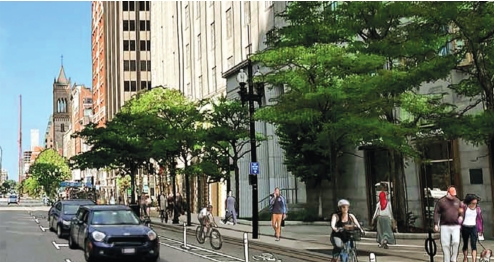
The city has begun adding bike and bus lanes to Boylston Street, kicking off weeks of intermittent road work along with furious debate among residents and commuters.
Boylston’s redesign comes courtesy of the Back Bay Mobility Projects, a sweeping initiative covering almost the entire neighborhood. Workers broke ground for the Boylston section on June 9, with the aim of installing bus and bike lanes, changing parking with new moped loading zones and new signals separating turn lights from crossing periods.
The redesign will be
starting on Massachusetts Avenue and working its way east to Arlington
Street. Sidewalks will remain open, but planners do anticipate the need
for parking restrictions around affected areas.
A
city spokesperson said they expect work to continue for about three
weeks, probably ending near the start of July. Workers will be
installing new markings and flex posts at night, saving daytimes for
signal changes and sign installation.
"The
changes on Boylston Street will make the roadway safer for all who
live, work and visit in the Back Bay, improving speed and reliability
for the more than 13,000 people who ride on the bus each day,” said the
Boston Transportation Department (BTD).
“We’ve
worked with local residents and business owners to gather feedback,
which will improve pedestrian safety, update curb regulations, and
reduce conflicts between the thousands of pedestrians, drivers,
bicyclists, and bus riders who travel Boylston on a typical weekday.”
A
recent survey by the Neighborhood Association of the Back Bay indicated
the second most concerning issue for residents were safety conflicts
stemming from cars, pedestrians and cyclists sharing the road. The new
separated lanes from Mass. Ave. to Arlington may help address that but
do come with drawbacks.
The
new layout’s bus infrastructure will squeeze Boylston down to a single
standard lane from Ring Road to Copley Station from 4 to 7pm on
weekdays, a decision that prompted frenzied objection from some
residents online.
Even
two-lane streets in the Back Bay are frequently at risk from double
parkers due to lax traffic enforcement, but city planners are apparently
unconcerned with that possibility. Spokespersons for the BTD stopped
responding to questions when asked about whether the city had concerns,
what studies they’d performed and whether a plan was in place to remove
the changes if they prove unworkable.
The new layout will also cost roughly 100 parking spaces, dropping the street’s total from 324 to 236.
City Councilor Ed Flynn has been among the most outspoken critics of the changes.
A
forum he held on June 5 saw a strong showing from cyclists in support
of the project, but he said in a June 14 interview that his position
hadn’t changed.
“My
goal was to listen to the voices of residents, and the business
community. It’s clear to me that the BTD officials did not listen to
recommendations made by either. It’s true that there are a lot of people
that use Boylston that do not live in the Back Bay, but I believe this
plan implemented by the BTD without any real input from the business
community will have a negative impact on businesses.”
Despite
opposing the project, Flynn declined to say which specific elements he
would like to see changed, or to specify what steps he would have liked
to see from the BTD during outreach efforts.